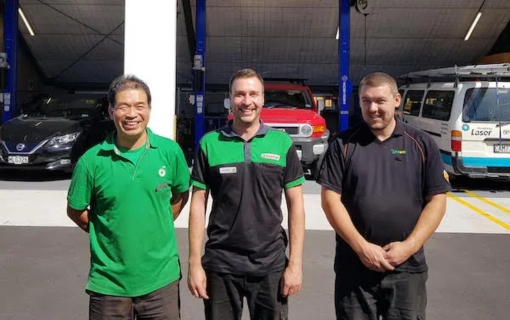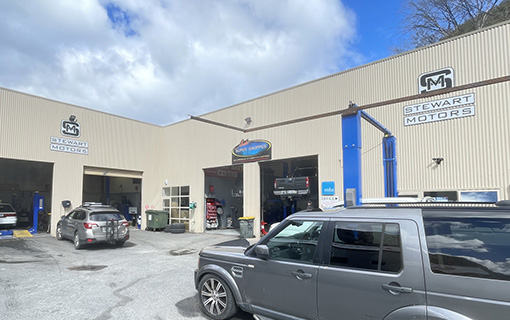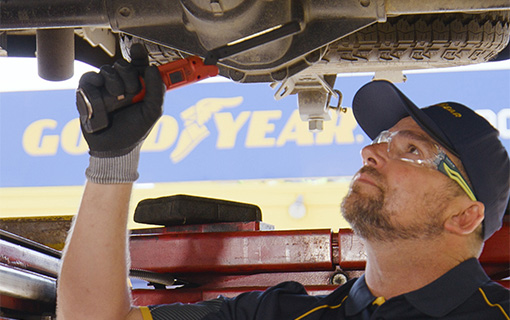
Kelvin Armstrong started his first workshop, KAAR, nearly 30 years ago. Then he opened a 2nd site, 10 years ago, won multiple business awards and served on the boards of key groups in and out of the automotive community. In this interview, we chat to Kelvin about implementing time-clocking in his workshops and getting his techs onboard.
Q. Why did you start measuring your productivity?
A. The car park and diary was full. I was working non-stop and my team was working plenty of overtime. We were flat out busy, but unsure our profitability was where it should be. I was fairly focused on any business improvement. SAM advised time clocking was available, but initially, I didn’t want to upset my mechanics – my initial perspective was that time-clocking was for the untrusting dealerships to keep an eye on the unruly mechanics. It took me about a year to convince myself I would not ruin the culture and relationship I had with my team.
Q. You say you waited a year after time-clocking came out, why was that?
A. It was about convincing me to convince my staff to come on board and I also wasn’t sure if I could get any more productivity out of them. From the staff perspective, it’s scary, and it’s got that Big Brother factor, so asking them to use time-clocking can seem like we’re moving towards a dictatorship and standing over them.
Q. How did you change the conversation from dictatorship to profits?
A. The angle we went with was “we’ve done a cost analysis” on a clutch replacement, on a particular vehicle, that we’ve quoted 4 hours to complete, for years, but was it really taking 4 hours? Or is it longer? Are vehicles still making a profit?”.
We went back to the team and talked them through it. It’s not about them working faster! We then started measuring a few jobs. We chose some easy targets and I told them “it’s not your problem, it’s my problem. We need to know how long you’re spending on a job and if we are charging appropriately. But right now, I’m just guessing/estimating”. We put the emphasis back onto the profit and they got it.
“It’s not your problem, it’s my problem. We need to know how long you’re spending on a job and if we are charging appropriately. But right now, I’m just guessing/estimating”
Kelvin Armstrong, KAAR
Q. So, you put the emphasis back onto the profit and away from monitoring your staff?
A. Yeah, it’s not because they’re working slow, (in most cases). From a team’s perspective, it’s about the front office charging out correctly. High productivity comes from having strong processes, good techs, a good culture, the right tools and a great service adviser/manager.
Most of us can identify in our teams the highly productive and the not so, you’ve got to measure the difference between them, manage the type of work they are good at, identify efficiencies from front-of-house, and how can you do this without measuring (time clocking).
Q. What were some other benefits of using time-clocking?
A. As well as using time-clocking to make sure we weren’t losing any more by undercharging, it also meant I was able to dig into how to grow their productivity.
I can easily see, when my team are improving or declining, in real-time. Today it’s really important to reward your team’s progression and improvements because if you don’t, someone else will.
When doing staff reviews, you have the evidence in front of you to create discussions for improvement goals or whether you are underestimating their worth.
Q. Did you need to incentivise your team to use time-clocking?
A. We don’t incentivise towards productivity, as I don’t want the work rushed and have the quality diminish. We incentivise for upsells. We ensure the techs check everything and are thorough.
For time-clocking, it’s about having the right culture, and for us, that’s competitive and consistent. We leverage their competitive nature to encourage their productivity where possible.
It’s hard to do financial incentives when you’re already paying guys good money though. The advantage with high productivity outcome is more profit for the business and the ability to pay your team what they deserve.
“The advantage with high productivity outcome is more profit for the business and the ability to pay your team what they deserve.”
Kelvin Armstrong, KAAR
Q. Is there any advice if implementing time clocking you would give?
A. Ensure you put in the costs of your staff correctly. A quick fix to stop writing down/off labour. Create a rule for your service adviser/admin. Do not write down any labour. Create an internal customer (your business) and split off labour to this company. Set up an email address directly to you, for these invoices. You may be shocked by how much time is being written off. Once the habit of writing off time is stopped, stop it as your labour reports will become invalid. What this does is create a process that is awkward for the invoice creator and sends you the invoices to find out why time is being written off.
Q. How do you incentivise the upsells?
A. I incentivise on upsells by getting the techs to find other work to do on the cars. It’s rewarding thoroughness, it’s not about finding work that is not required. The vehicle history is key for them to see what was done last time. There are times when they need to see if the upsells such as, brake fluid change, transmission service, gear oils etc that are due, which at times can get missed in some workshop environments.
The techs really need access to the vehicle history to be able to do this. We monitor to ensure unnecessary sales are identified, though our team culture keeps it in check.



